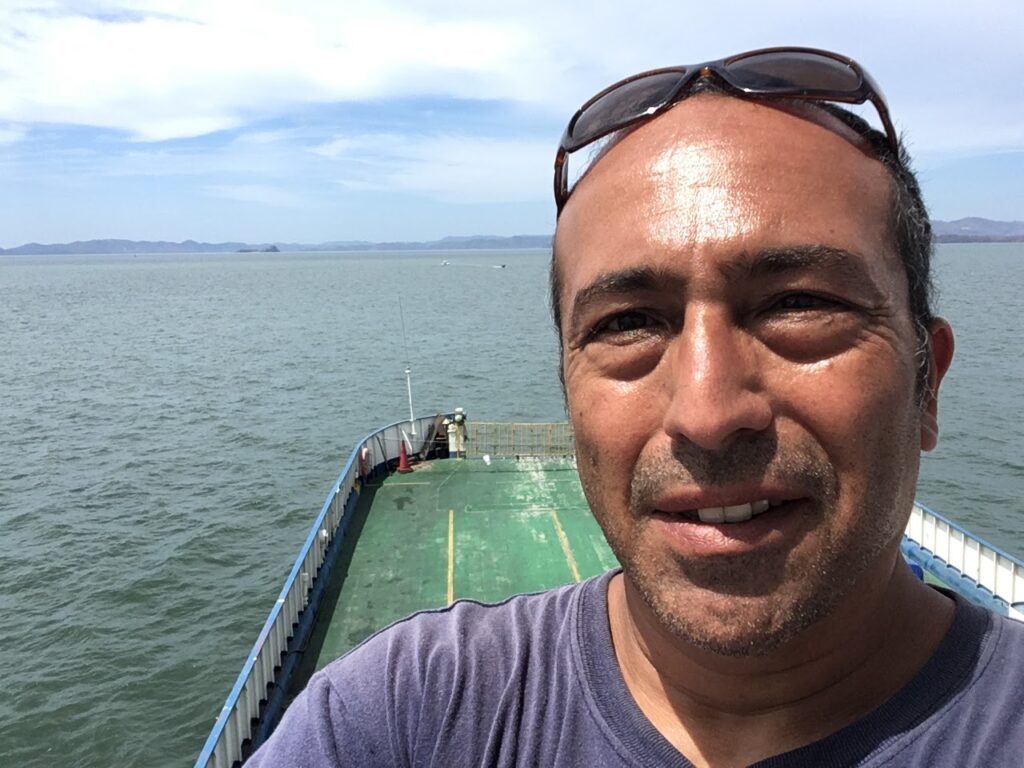Stories from the Coastal Zone: Communicating the Science of Small-Scale Fisheries
David Robledo
Science and Technical Communications Expert, Environmental Advocate
2020 Fulbright U.S. Student to Costa Rica


David Robledo is an expert on science communication with a passion for environmental sustainability. He pursued his doctoral research in Costa Rica with the help of the Fulbright Program.
Robledo, who identifies as Hispanic and hails from a farmworker family in South Texas, embarked on a journey to graduate school after raising his own family. His firsthand experience underscores the challenges that students with family and work responsibilities encounter while pursuing advanced degrees. Moreover, he possesses a profound understanding of the significance of research in addressing the needs of individuals who may otherwise be overlooked or forgotten.
“I was doing a lot of environmental work with farmers markets and small-scale businesses while I raised my children,” Robledo told Texas Tech Today. He had worked in media and as a communications adviser to promote environmental and food sustainability while being a full-time father, and decided to go back to school to sharpen his skills. He identified a doctoral program in technical communication and rhetoric at Texas Tech University that combined his communications background with his commitment to environmental conservation.
Robledo, whose grandfather was a fisher, focused his doctoral dissertation on an environmental issue close to his heart: small-scale fisheries. He applied for and received a Fulbright award to Costa Rica to conduct research with marine scientists who were investigating how the role of small-scale fisheries promote biodiversity. “Receiving a Fulbright award is a little like getting a ticket to the moon,” Robledo said at the time. “You are not sure what to expect, but you know it is going to shift your perspective in irreversible ways.”
His Fulbright year supported his Ph.D. research in new-media studies and science communication. Robledo investigated how marine scientists, policy makers, and small-scale fishers engaged on common challenges.
“Marine scientists and marine communication researchers are trying to find a way forward in the fishery depletion crisis that will reclaim the ocean biodiversity of past decades,” he said. Robledo felt these initiatives have intense cultural and economic implications, since 40% of humanity lives in coastal zones.
He observed and interviewed small-scale fishers and labor organization leaders to document the biodiversity and nutrition economy benefits of the industry. He found that constraints, such as week-long stretches when the fishing is poor, and environmental factors such as rough tides, high velocity winds, and almost daily downpours or storms in season, introduce persistent limitations on the small-scale fishers in Costa Rica. This limits the extraction of fish but also promotes biodiversity.
“These fisheries are important to cultural economies, small cafés and seafood markets, to people who have made their livings in these ways for generations and generations,” he said. “My research is looking at this interconnection between marine scientists and small-scale fishers and how they support each other’s work in order to bring ideas for policy that can improve fisheries in this time of collapse.”
Returning to the United States, Robledo came back determined to use his science communication skills to tell the story of the people he worked with as a Fulbrighter, and also mentor others to communicate clearly about science and their own research. He shares his knowledge with groups like the Association of Teachers of Technical Writing, and has developed and taught curriculum for courses such as a National Science Foundation-funded course on “Engineering, the Environment, and the Community.”
Robledo also volunteers as a Fulbright Alumni Ambassador, where he is eager to mentor students who have worked or had families prior to college enrollment, and those from a Hispanic background, learn more about applying to the Fulbright Program. He also shares his knowledge on how to conduct research on workers who use traditional techniques, such as how to sensitively interview and engage local communities.
“Fulbright projects are chosen because the subjects under study are important to the world. Ultimately, the Fulbright legacy opens doors for research and teaching that otherwise might not present themselves,” Robledo said. “It’s an experience that is defined by change, for the Fulbright scholar or teacher, and for the futures that they will follow.”
After his Fulbright, he spent six months working as a lecturer in science and engineering communication at MIT before becoming a lecturer in technical communication at Old Dominion University in 2023. During this time, he has shared his research in a policy brief, a conference paper on “Food Security and Biodiversity Repair,” and he has plans to make a documentary film about the global problems he studied and observed in Costa Rica.
Robledo credits the faculty and staff across Texas Tech University for his Fulbright experience, as well as his research affiliates in Costa Rica, including the National University of Costa Rica, University of Costa Rica’s Center for Marine Science and Limnology Research, The Great Basin Institute, and CoopeSoliDar R.L. in San Jose, a labor organization that works with small-scale fishers.
Robledo is grateful for the “people, resources, organizations and more” who came together to support his research ideas. “This web of care and effort to ideas, in my opinion, is what a Fulbright award is really about.”